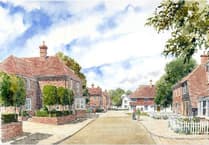The Planning Inspectorate has rejected plans for more than 270 homes in the Badshot Lea and Weybourne area – despite criticising Waverley Borough Council for lacking a "credible strategy" to address local housing need.
It was confirmed today (Friday) that Bewley Homes appeal against Waverley's refusal of planning permission for 140 homes in Lower Weybourne Lane has been dismissed by government inspector DR McCreery.
And it comes just days after Lamron Developments' appeal against Waverley's refusal of 131 homes on land south of the SSE depot and east of Green Lane, Badshot Lea, was also dismissed.
Both potential housing sites are located on sites rejected for development in Waverley's Local Plan and the Farnham Neighbourhood Plan, sitting outside of the town's defined build-up area boundary.
The Bewley Homes/Lower Weybourne Lane ruling follows a three day inquiry earlier this year, and marks the third time a planning application on this site has been rejected at appeal since 2018.
The appeal centred around two main issues: the effect of the proposal on the character and appearance of the area, and its implications for housing supply or delivery.
Ultimately, the inspector ruled in favour of the council, highlighting the conflict with local planning policy and the importance of preserving the area's landscape character and preventing "coalescence" between settlements like Badshot Lea and Weybourne.

The inspector, Darren McCreery, recognised that while the proposal could be mitigated to some extent, it would result in a clear increase in coalescence, compromising the Neighbourhood Plan's objectives.
And in a statement that will delight those who fought to bring Farnham's community-led planning document to adoption, he emphasised the significance of the Neighbourhood Plan in shaping the local environment and the importance of maintaining its credibility.
Mr McCreery said: "A grant of planning permission for the proposal in these circumstances would seriously undermine the credibility of the Neighbourhood Plan as the conflict with it could not be clearer.
"I am also mindful of the role that neighbourhood planning has as part of ensuring that the planning system is genuinely plan led and all that Paragraph 15 [of the National Planning Policy Framework] says about providing a positive vision and a platform for local people to shape their surroundings.
"As a consequence, the clear conflict with the strategy in the Neighbourhood Plan, delivered through the explicit detail of FNP10 and FNP11 is a matter that attractsconsiderable weight."
While acknowledging the poor overall housing supply position in the borough, the inspector determined that the Neighbourhood Plan was not significantly impeding housing development but instead providing a positive vision for the future.
Mr McCreery did, however, criticise Waverley Borough Council for allowing a shortfall in housing delivery against national targets to persist over a "considerable period", and suggested a rethink of its strategy to locate a large number of homes at problematic 'major' sites such as Dunsfold Park and Milford golf course.
Waverley is required by the government to identify sites for a five-year supply of housing to meet its target of delivering 779 homes per year in the borough – but according to the appeal decision, is only currently able to demonstrate a 3.53 to 4.28 year supply of housing land.
The inspector continued: "The adoption of the Local Plan Part 2 is a step in the right direction. However, its housing site allocations are geographically contained and relatively small in a wider Borough context.
"There is little concrete evidence to demonstrate that the council has a credible strategy, including progressing through an agreed timetable for updating the Local Plan Part 1, that will address the housing land supply issues of the borough on a wider basis anytime soon.
"In these circumstances, the appellant is correct to characterise the shortfall in housing land supply as significant."
However, the inspector concluded that the adverse impacts of granting planning permission would outweigh the benefits, when assessed against the policies in the National Planning Policy Framework as a whole.
It echoes the reasons given the dismissal of Lamron Developments' 131-home appeal at Green Lane on Monday, with the inspector D Wallis stating the proposed development "would harmfully impact upon the character and appearance of the area", adding its proposed access onto Green Lane would have an "unacceptable impact on highway safety".


.png?width=209&height=140&crop=209:145,smart&quality=75)


Comments
This article has no comments yet. Be the first to leave a comment.